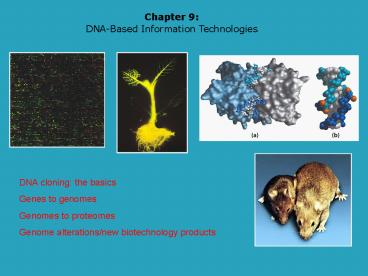DNABased Information Technologies - PowerPoint PPT Presentation
1 / 75
Title: DNABased Information Technologies
1
Chapter 9 DNA-Based Information Technologies
DNA cloning the basics Genes to genomes Genomes
to proteomes Genome alterations/new biotechnology
products
2
Tuesday, Apr 24 ESB 1001330 PM (W.E. Palke
Memorial Lecture) Bruce Berne- Columbia
University Hydrophobibity and Drying in Physical
and Biological Systems
BMSE SeminarFriday April 27, 2007300pmWebb
1100SILVIA CAVAGNEROUniversity of
Wisconsin-MadisonDepartment of ChemistryProtein
folding at birth experimental and computational
studies on and off the ribosome
3
Biochemistry isolation and study of individual
cellular components and their reassembly Much of
this is defined by the genome Ability to
manipulate genes/genomes (1974)
Berg/Boyer/Cohen DNA cloning (recombinant DNA
technology/genetic eng.) endonucleases, vectors,
ligation, propagation, selection Type II
restriction endos (Arber/phage/restriction/modific
ation)
4
(No Transcript)
5
Overview of DNA cloning Episomal DNA (plasmid)
6
(No Transcript)
7
(No Transcript)
8
(No Transcript)
9
(No Transcript)
10
(No Transcript)
11
EcoRV endonuclease Mg dependent, blunt cutter,
phosphodiesterase
12
(No Transcript)
13
(No Transcript)
14
Prediction of site number Origin (200 bp, timing,
plasmid specific)
15
Plasmid cloning (libraries)
16
(No Transcript)
17
(No Transcript)
18
Form of replica plating
19
Replica plating
20
Bacteriophage ? cloning vectors 48 Kb, ds DNA,
linear Remove genes not needed for phage
replication Filler genes Capsids
21
(No Transcript)
22
(No Transcript)
23
Bacterial artificial chromosomes (BACS) (John
Carbon, UCSB, and others)
Cloning of 100-300Kb segments
24
Yeast (eukaryotic) artificial chromosomes
(YACS) Yeast genome only 4X E.coli (14 x 106
bp) Origin, CEN, telomeres, selectable markers
25
(No Transcript)
26
(No Transcript)
27
Hybridization to identify clone/DNA
segment Selection vs screen
28
(No Transcript)
29
(No Transcript)
30
Hybridization probe design
Redundant probes (23 8)
31
Typical E.coli expression vector
Q name two-three expression vectors sold by New
England Biolabs, Invitrogen, Promega, Stratagene
and their unique features
32
Site directed mutagenesis (protein engineering,
genetic engineering)two approaches Current
method (Stratagene, Quickchange)
33
- 9.2 From genes to genomes
- DNA libraries
- Contigs
- Sequence-tagged sites (STS)
- cDNAs/cDNA libraries
- Expression sequence tag (EST)
34
Ordering of clones in DNA library
Markers
Contig long contiguous segment STS
sequence-tagged site (markers)
35
cDNA library from mRNA Poly T cellulose
36
(No Transcript)
37
(No Transcript)
38
Reporter constructs, GFP, gene fusions, epitope
tags Cellular, tissue, subcellular
expression/localization
C.elegans, fusion protein expressed in specific
neurons
39
(No Transcript)
40
PCR, Mullis, Nobel prize, CEN article
41
(No Transcript)
42
(No Transcript)
43
(No Transcript)
44
Cloning of amplified DNA
45
(No Transcript)
46
(No Transcript)
47
RFLPs, SNPS
48
The 1000 genome Genomics, pharmacogenomics,
toxicogenomics Personalized medicine, molecular
diagnostics
49
(No Transcript)
50
9.3 Genomes to proteomes Proteomics Phenotypic Ce
llular Molecular
51
Cellular gene expression Genetic networks 35,000
human genes 1013 cells How controlled/regulated?
2D PAGE/MS Gene chips Affymetrix Chip on Chip
52
(No Transcript)
53
(No Transcript)
54
(No Transcript)
55
(No Transcript)
56
(No Transcript)
57
(No Transcript)
58
Genetic regulatory networks
59
Common strategies to read the genome/proteome mR
NA analysis 2D-PAGE and MS/MS
How to identify active regulatory parts of the
genome which control transcription?
60
Yeast two hybrid identification of interacting
proteins
61
(No Transcript)
62
9.4 Genome alterations and biotech products Plant
bacterial parasite used for cloning (no
plasmids) Agrobacterium (crown gall formation)
63
(No Transcript)
64
Two plasmid approach to make recombinant plants
65
(No Transcript)
66
(No Transcript)
67
Tobacco plant expressing firefly luciferase
68
(No Transcript)
69
(No Transcript)
70
Retroviral vectors for mammalian cell cloning
(gene therapy) Cell/tissue specificity Emasculated
virus Silencing
71
(No Transcript)
72
(No Transcript)
73
Spatial/temporal control over gene regulation
basic research/therapeutics of the future
74
(No Transcript)
75
(No Transcript)































